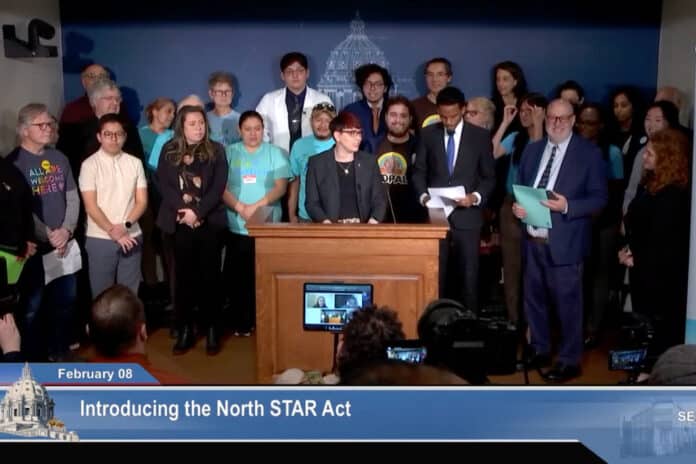
A pair of Democrat legislators sponsoring a bill that would make Minnesota a “sanctuary state” for immigrants who enter the country illegally artfully sidestepped a question from media Thursday as to whether the legislation will have full support from their DFL colleagues in the state Senate. Democrats outnumber Republicans 34-33 in that upper chamber.
Will Sen. Omar Fateh, DFL-Minneapolis, chief author of the proposal he’s coined “The North Star Act,” obtain all 34 Democrat votes he needs to pass the bill in the Senate?
“So far I have received a lot of enthusiastic feedback right now,” Fateh told media at a press conference on the bill he and Rep. Sandra Feist, DFL-New Brighton, held at the Capitol Thursday, just four days before the legislative session begins.
The legislation would bar local, county and state law enforcement and other government agencies like school districts from asking someone about their immigration status. It would also prohibit local and state agencies from sharing data or collaborating with federal officials to enforce immigration laws, unless it is part of a criminal investigation.
Gov. Tim Walz previously indicated his support for such a proposal when he ran for governor in 2018. Last year, Democrats approved legislation which allows illegal immigrants to obtain driver’s licenses, receive free college tuition, and access a state-run insurance program.
“We are still having ongoing conversations with our caucus, but I am very confident we can get this across the finish line and we will keep working with everyone to make that happen,” Fateh said, adding that “about 10” senators have expressed interest in supporting the bill.
Amid record illegal immigration, Minnesota Democrat Omar Fateh says the state should not "waste resources" on enforcing immigration laws. pic.twitter.com/R9Ppydm1j0
— Alpha News (@AlphaNewsMN) February 9, 2024
Fateh didn’t name the handful of DFLers who have already signed on as co-authors. The bill has yet to be filed for formal introduction, but Rep. Feist, the chief author in the House, said she expects the bill will be published online by Monday at the latest.
While Feist knows she doesn’t need all 70 members of the House DFL caucus to support the proposal, she beat around the bush a bit when asked how many of her Democrat colleagues will end up supporting it.
She said 35 House members have signed onto the bill and also emphasized that a number of the few dozen supporters on hand for the press conference explaining the bill on Thursday were from Greater Minnesota, including some who traveled to the Capitol from communities like St. Cloud and Mankato.
The bill Fateh and Feist are pushing this session differs from a similar bill they introduced during the 2023 session that Feist said featured more broad-based language that she explained wasn’t “tightly crafted” enough to gain the support it needed.
“We spent the entire interim working really closely with legal experts, law enforcement stakeholders, state agencies, with communities that will be impacted to ensure the bill we draft (this session) is very technically sophisticated and will achieve its goals and not have unintended consequences,” Feist said.
Republicans in the House have criticized the latest version of the bill, saying it would incentivize a wave of immigrants who enter the U.S. illegally to settle in Minnesota.
“Minnesotans want a secure border — not to turn our state into a magnet for illegal immigration. Sanctuary cities in other parts of the country have struggled with the surge in illegal immigration and caused a tremendous strain on housing, education, food shelves, health care, public safety, and other resources,” House Minority Leader Lisa Demuth, R-Cold Spring, said Thursday. “Minnesotans simply do not support this extreme policy, especially at a time when we are seeing chaos at the border.”
The first stop for the bill in both the House and the Senate will be the State and Local Government committees. Feist said she expects the bill to also receive hearings in the Public Safety and Judiciary committees as well, before it would be able head to a vote on the House Floor.
“This will incentivize more to come and increase the strain on our already overburdened health, welfare and education systems. Local and county officials are already asking for more [money] to meet current needs,” Rep. Kristin Robbins, R-Maple Grove, said in response to the bill last week.
Democrats are pushing the bill on the heels of Minneapolis Public Schools’s announcement last month that the majority of 2,500 Spanish-speaking students recently enrolled in the district are new to the country.
At the Thursday press conference on the bill, Andrea Bauer, a teacher who specializes as a cultural liaison for District 191 (Burnsville, Eagan and Savage) echoed that experience.
“Our district, like many, has had an unprecedented number of ‘new-in-the-country’ students over the last few years,” said Bauer, who supports the bill, which she believes will help students whose families have undocumented status not fear the threat of deportation. “I personally do the intake with students and their families, for hundreds every single year.”
Hank Long
Hank Long is a journalism and communications professional whose writing career includes coverage of the Minnesota legislature, city and county governments and the commercial real estate industry. Hank received his undergraduate degree at the University of Minnesota, where he studied journalism, and his law degree at the University of St. Thomas. The Minnesota native lives in the Twin Cities with his wife and four children. His dream is to be around when the Vikings win the Super Bowl.











